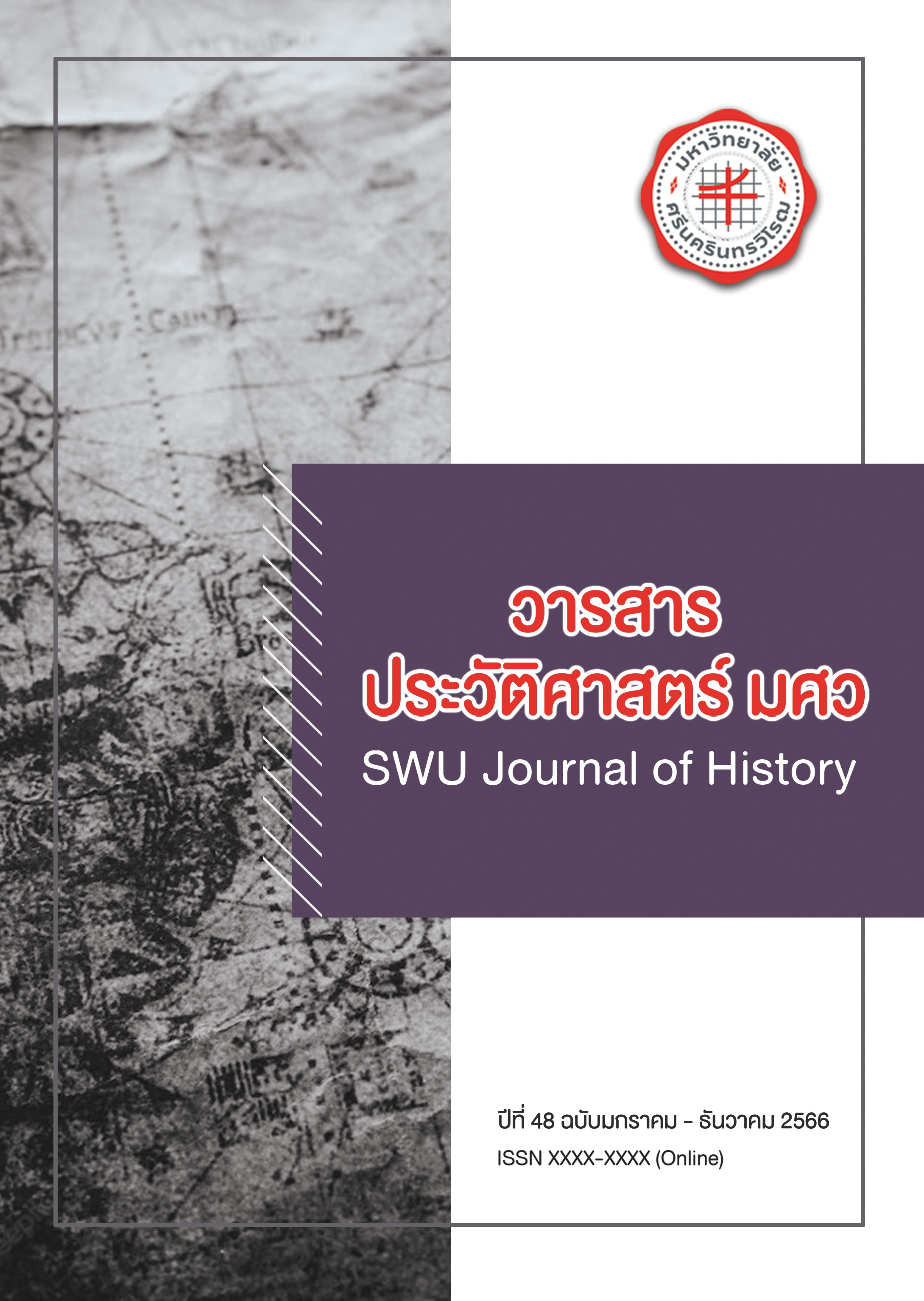“สมาคมพ่อค้าอันยิ่งใหญ่ที่สุดแห่งจักรวาล”: จุดเริ่มต้นและจุดจบของบริษัทอินเดียตะวันออกของอังกฤษ
Main Article Content
บทคัดย่อ
ตลอดประวัติศาสตร์ที่ยาวนานมากกว่า 2 ศตวรรษ บริษัทอินเดียตะวันออกของอังกฤษซึ่งก่อตั้งใน ค.ศ. 1600 เพื่อทำการค้าเครื่องเทศในโลกตะวันออกได้พัฒนาสถานะจนได้เป็นผู้ปกครองที่แท้จริงเหนืออนุทวีปอินเดีย ดินแดนที่อุดมสมบูรณ์ที่สุดแห่งหนึ่งของโลก ทำให้บริษัทได้รับสมญาว่าเป็น “สมาคมพ่อค้าอันยิ่งใหญ่ที่สุดแห่งจักรวาล” การที่บริษัทแห่งนี้ได้รับสิทธิพิเศษในการควบคุมกองทัพและการทำสงครามกับชาวพื้นเมืองอย่างเป็นอิสระจากรัฐบาลอังกฤษเปิดทางให้บริษัทจัดตั้งและขยายอำนาจในอนุทวีปได้อย่างต่อเนื่อง ชัยชนะของบริษัทในยุทธการที่ปลาสซี ค.ศ. 1757 ถือเป็นจุดเริ่มต้นของ “สมัยการปกครองของบริษัทอินเดียตะวันออก” ที่บริษัทมีบทบาทในฐานะผู้ปกครองอินเดียแทนเจ้าเมืองท้องถิ่น อย่างไรก็ดี นับตั้งแต่ช่วงเวลาดังกล่าวบริษัทอินเดียตะวันออกของอังกฤษไม่ได้เป็นเพียงบริษัทการค้าอีกต่อไป แต่เป็นผู้ปกครองที่มีอำนาจเต็มเหนืออนุทวีปอินเดียด้วย ทำให้รัฐบาลอังกฤษพยายามเข้าแทรกแซงกิจการของบริษัทหลายครั้งเพื่อเพิ่มบทบาทของรัฐบาลในการบริหารปกครองอินเดีย บทความชิ้นนี้มุ่งสำรวจประวัติศาสตร์ของบริษัทอินเดียตะวันออกนับตั้งแต่จุดเริ่มต้นในฐานะบริษัทการค้าทางทะเล จนถึงช่วงที่อำนาจของบริษัทรุ่งเรืองถึงขีดสุดเมื่อบริษัทมีอำนาจปกครองครอบคลุมทั้งอนุทวีป และรวมถึงจุดเสื่อมของบริษัทใน ค.ศ. 1858 หลังรัฐบาลอังกฤษเข้าควบคุมการบริหารอินเดียทั้งหมด แม้ประวัติศาสตร์ของบริษัทอินเดียตะวันออกจะเป็นเรื่องราวของสงครามและความรุนแรงที่บริษัทได้กระทำต่อเจ้าเมืองและผู้คนในอนุทวีป แต่ก็ปฏิเสธไม่ได้ว่าช่วงเวลา 2 ศตวรรษที่บริษัทมีบทบาทในอนุทวีปเป็นการวางรากฐานให้อังกฤษได้ครอบครองอินเดียซึ่งถือว่าเป็น “เพชรยอดมุงกุฎ” แห่งจักรวรรดิอังกฤษโดยสมบูรณ์
Article Details

อนุญาตภายใต้เงื่อนไข Creative Commons Attribution-NonCommercial-NoDerivatives 4.0 International License.
เอกสารอ้างอิง
Andaya, Barbara Watson; & Andaya, Leonard Y. (2015). A History of Early Modern Southeast Asia, 1400-1830. Cambridge: Cambridge University Press.
Banerjee-Dube, Ishita. (2015). A History of Modern India. New Delhi: Cambridge University Press.
Boxer, C. R. (1965). The Dutch Seaborne Empire, 1600-1800. London: Penguin.
Chandra, Satish. (2004). Medieval India from Sultanat to the Mughals: Part One, Delhi Sultanat (1206-1626). Third Edition. New Delhi: Har-Anand.
Clulow, Adam; & Mostert, Tristan. (2018). The Dutch and English East India Companies: Diplomacy, Trade and Violence in Early Modern Asia. Amsterdam: Amsterdam University Press.
Dalrymple, William. (2019). The Anarchy: The Relentless Rise of the East India Company. London: Bloomsbury.
Daniell, Christopher. (2006). A Traveller's History of England. Fifth Edition. Massachusetts: Interlink Books.
Dijk, Wil O. (2006). Seventeenth-century Burma and the Dutch East India Company, 1634- 1680. Singapore: Singapore University Press.
Merriman, John. (2004). A History of Modern Europe: From the Renaissance to the Present. New York: W. W. Norton & Company.
Peers, Douglas M. (2013). India Under Colonial Rule: 1700-1885. New York: Routledge, 2013.
Phillips, Andrew; & Sharman, J. C. (2022). Outsourcing Empire: How Company-States Made the Modern World. New Jersey: Princeton University Press.
Richards, John F. (1993). The Mughal Empire. Cambridge: Cambridge University Press.
Robins, Nick. (2012). The Corporation That Changed the World: How the East India Company Shaped the Modern Multinational. London: Pluto.
Sykes, Adrian. (2011). Made in Britain: The Men and Women Who Shaped the Modern World. London: Adelphi.
Williams, Hugh. (2008). Fifty Things You Need to Know About British History. London: Collins.
Wilson, Jon. (2017). India Conquered: Britain’s Raj and the Chaos of Empire. London: Simon & Schuster.
Brunton, Bruce. (2013). The East India Company: Agent of Empire in the Early Modern Capitalist Era. Social Education. 77(2): 78-81, 98.
Harris, Robert D. (1976, June). French Finances and the American War, 1777-1783. The Journal of Modern History. 48 (2): 233-258.
AMDigital. (2017). The captain-general of iniquity: The impeachment of Warren Hastings. Retrieved January 15, 2023. https://www.amdigital.co.uk/insights/blog/the-impeachment-of-warren-hastings
ART UK. (n.d.). Shah 'Alam, Mughal Emperor (1759-1806), Conveying the Grant of the Diwani to Lord Clive, August 1765. Retrieved March 15, 2023. https://artuk.org/discover/artworks/shah-alam-mughal-emperor-17591806-conveying-the-grant-of-the-diwani-to-lord-clive-august-1765-191206
Ota, Atsushi. (2013). The Dutch East India Company and the Rise of Intra-Asian Commerce. Retrieved January 15, 2023. https://www.nippon.com/en/features/c00105/
Bekhrad, Joobin. (2020). The floral fabric that was banned. Retrieved March 15, 2023. https://www.bbc.com/culture/article/20200420-the-cutesy-fabric-that-was-banned
Bogart, Dan. (2015). The East Indian Monopoly and the Transition from Limited Access in England, 1600-1813. Retrieved January 15, 2023. https://www.nber.org/system/files/chapters/c13506/revisions/c13506.rev0.pdf
Britannica. (2022). East India Company. Retrieved December 2, 2022. https://www.britannica.com/topic/East-India-Company
Britannica. (2023). Joseph-François Dupleix. Retrieved January 10, 2023. https://www.britannica.com/biography/Joseph-Francois-Dupleix
National Archives. (n.d.). Currency converter: 1270-2017. Retrieved January 10, 2023. https://www.nationalarchives.gov.uk/currency-converter/
Ramesh, Randeep. (2007). India's secret history: ‘A holocaust, one where millions disappeared.... Retrieved March 18, 2023. https://www.theguardian.com/world/2007/aug/24/india.randeepramesh
StudySmarter. (n.d.). Dutch East India Company. Retrieved January 10, 2023. https://www.studysmarter.co.uk/explanations/history/modern-world-history/dutch- east-india-company/
Sunavala, Nergish. (2018). 350 years ago, Bombay was given to the East India Company and 'Urbs Prima in Indis' was born. Retrieved December 30, 2022. https://timesofindia.indiatimes.com/city/mumbai/350-yrs-ago-bombay-was-given-to- the-east-india-company-and-urbs-prima-in-indis-was-born/articleshow/63473263.cms


